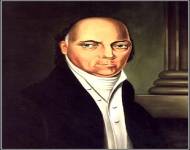Early Life
John Blair, Jr. was born in Williamsburg, Virginia, in 1732 to a prominent Virginia family. Blair attended the College of William and Mary, earning his Bachelor’s Degree in 1754. He went on to study law for a year in London before returning to his home state to start his legal practice.
Career
Blair began his work in the public sector in 1766 after being elected to the Virginia House of Burgesses. In 1770, he became Clerk of the Royal Governor’s Council, a post he held until 1775.
When the Revolutionary War began, Blair became active in the government of Virginia, serving as delegate to the Virginia Convention of 1776 that drafted the state’s constitution. In the late 1770s, Blair held the positions of Chief Justice of the Virginia General Court, Chancellor of the High Court of Chancery, and member of the Virginia Court of Appeals.
During the 1780s Blair served as a jurist administering laws in Virginia. His success in this position earned him the appointment as Thomas Jefferson’s successor on revising laws in the state of Virginia. Blair became one of only three Virginia delegates to sign the Constitution in 1787.
Supreme Court
President Washington nominated Blair to serve as Justice on the United States Supreme Court on September 24, 1789, and the Senate confirmed him two days later. Blair spent only five years serving on the Supreme Court, and on October 25, 1795, he resigned citing issues with poor health.
During his time as Associate Justice, the Supreme Court only saw a few cases. Most notable of the cases was the 1793 Chisholm v. Georgia hearing. Justice Blair ruled in the majority against the state of Georgia, arguing that citizens ought to have the right to sue the federal court of another state.
Death
Blair died in his hometown of Williamsburg, Virginia on August 31, 1800, at the age of sixty-eight.









